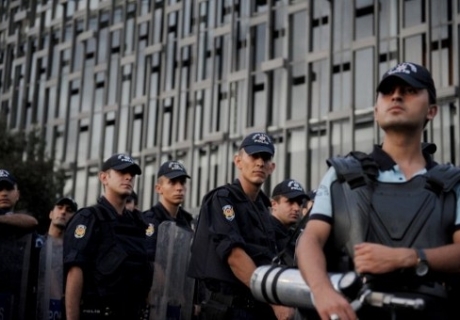Large amounts of explosives have been found across Turkish cities over the past few days, which the police say were being stored for use in violent attacks staged by the terrorist Kurdistan Workers' Party (PKK) during this year's annual spring festival of Nevruz, mainly celebrated by Kurds in Turkey, which occurs in the latter half of March, Today's Zaman reported.
Intelligence reports have long been suggesting that the PKK is planning bloody attacks during Nevruz, which is celebrated by at least 100,000 people on the streets of Diyarbakır alone. There are also celebrations in other southeastern cities. İstanbul counterterrorism police units on Wednesday, who were excavating two sites in İstanbul in search of explosives as part of an investigation into the Kurdish Communities Union (KCK) found 15 kilograms of plastic explosives. The KCK is an umbrella organization for the PKK and other affiliated groups. Excavations are still under way in search of more explosives. Also earlier in the week, police discovered nearly five kilograms of explosives in the Basaksehir district of İstanbul, also found during a dig carried out as part of the probe into the KCK. On Thursday, 21 individuals in Diyarbakır were detained on suspicion of membership in the KCK, including the deputy mayor of the city's Yenisehir district.
The recent operations have clearly exposed the extent of bloodshed the PKK planned for Nevruz this year. Police in Diyarbakır have long been monitoring the "self-defense units," the name the PKK gives to its urban militants assigned the task of organizing violent demonstrations in the urban centers of the mainly Kurdish-dominated Southeast and eastern cities with majority Kurdish populations. One individual was captured as he was surveying a target site in February. The PKK, which failed to stage violent demonstrations at the scale it aimed for on Feb. 15 -- the anniversary of the capture of PKK chief Abdullah Ocalan by Turkish security forces in 1997 -- intelligence experts believe, does not wield the influence it has among the southeastern public and lacks the ability it previously had in organizational displays of power in the form of major demonstrations.
This is why it had to assign about 200 of its own militants, trained in the terrorist group's camps in the Kandil Mountains of northern Iraq, the task of going to urban centers to provoke demonstrations. Roughly 60 people have so far been captured by police after the exposure of the PKK's plans by Turkish security forces.
Police sources have said that the PKK, which recently suffered its greatest losses ever in clashes with Turkish security forces, has declared the year 2012, the year of revival and Serhilden, the Kurdish word for uprising. Nevruz, a two or three-day spring festival that usually starts around March 18, was chosen as the beginning for the PKK's planned activities for the year. The PKK, frustrated with the low attendance rate at the illegal demonstrations it tried to stage on Feb. 15 and the refusal of many local storekeepers to shut down their business for the day in protest of Ocalan's capture, will aggressively stage violent attacks, according to intelligence reports. Only about 500 people, at an event organized by Peace and Democracy Party (BDP) deputies, gathered on Feb 15. to protest the capture of Ocalan and his current conditions of imprisonment.
Information obtained from the 60 "self-defense units" militants indicate that the PKK wanted to provoke aggression by Turkish security forces on the locals, or, fire on crowds with long-range rifles if it fails to provoke security units during the demonstrations, and use the possible deaths as propaganda against the Turkish state.






